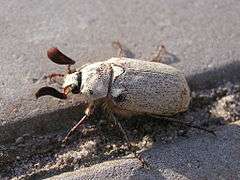Melolonthinae
| Melolonthinae | |
|---|---|
 | |
| Male Polyphylla alba (Melolonthini) | |
| Scientific classification | |
| Kingdom: | Animalia |
| Phylum: | Arthropoda |
| Class: | Insecta |
| Order: | Coleoptera |
| Superfamily: | Scarabaeoidea |
| Family: | Scarabaeidae |
| Subfamily: | Melolonthinae Samouelle, 1819 |
| Diversity | |
| About 20–30 tribes | |
| Synonyms | |
|
Hopliinae | |

Melolonthinae is a subfamily of the scarab beetles (family Scarabaeidae). It is a very diverse group; distributed over most of the world, it contains many familiar species. Some authors include the scarab subfamilies Euchirinae and Pachypodinae as tribes in the Melolonthinae.
Unlike some of their relatives, their habitus is usually not bizarre. They resemble the Rutelinae in being fairly plesiomorphic in outward appearance. Like in many Scarabaeidae, males have large fingered antennae, while those of the females are smaller and somewhat knobby. In the Melolonthinae, this sexual dimorphism is particularly pronounced. Many species have striking – though rarely brilliant or iridescent – hues and bold patterns of hairs.
Being often quite sizeable and swarming in numbers at certain times, for example the Amphimallon, Phyllophaga and Polyphylla "june beetles" or the Melolontha cockchafers – all from tribe Melolonthini – feature widely in folklore. Some Melolonthinae are economically significant pests. Other than the Melolonthini, the most diverse tribes are the Ablaberini, Liparetrini, Macrodactylini, Pachydemini and Sericini.
Systematics
.jpg)

According to various authors, the living Melolonthinae are divided into about 20-30 tribes. Some notable genera and species are also listed here:
|
|
In addition, a prehistoric tribe, the Cretomelolonthini, is only known from fossils.
Several genera are of unclear relations; they are not yet firmly placed in a tribe:
|
|
"Anonetus" and "Tryssus", both used by Erichson in 1847, are nomina nuda. Holophylla and Hoplorida are of uncertain validity.
Whether the scarab beetle Xenaclopus belongs in the present subfamily is doubtful. Alosimus, generally held to be a blister beetle of the Lyttini and not at all close to the scarabs, was placed in the Melolonthinae by entomologist Werner Heinz Muche.
References
![]() Data related to Melolonthinae at Wikispecies
Data related to Melolonthinae at Wikispecies
![]() Media related to Melolonthinae at Wikimedia Commons
Media related to Melolonthinae at Wikimedia Commons